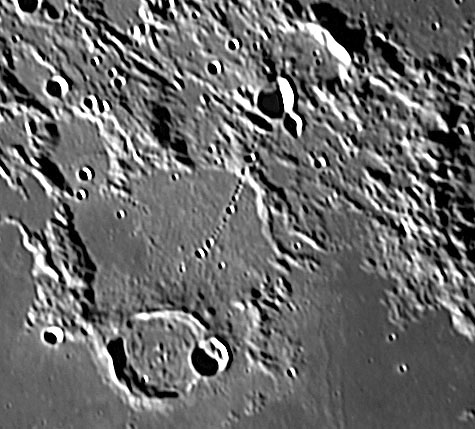Difference between revisions of "July 14, 2004"
| Line 20: | Line 20: | ||
<p class="story" align="center"><b>Jim and Davy </b></p> | <p class="story" align="center"><b>Jim and Davy </b></p> | ||
<p class="story" align="left"> | <p class="story" align="left"> | ||
| − | Feast your eyes on this remarkable telescopic image of the Davy crater chain! Jim Phillips took it with his 8" refractor and got a result that's closer to spacecraft views than Earthly images. The Davy chain looks like a target for machine gun practice, being a line of 13-25 (depending on your resolution) small craters splayed across the floor and onto the rim of the 70 km wide Davy Y. For many years this feature was misunderstood. Was it a secondary crater chain from a basin, or a chain of explosive volcanoes? As a previous [ | + | Feast your eyes on this remarkable telescopic image of the Davy crater chain! Jim Phillips took it with his 8" refractor and got a result that's closer to spacecraft views than Earthly images. The Davy chain looks like a target for machine gun practice, being a line of 13-25 (depending on your resolution) small craters splayed across the floor and onto the rim of the 70 km wide Davy Y. For many years this feature was misunderstood. Was it a secondary crater chain from a basin, or a chain of explosive volcanoes? As a previous [[January_27,_2004|LPOD]] discusses, both of those possibilities are probably wrong, but they were the only conceivable options until the Shoemaker-Levy impacts on Jupiter led to a realization that comets could be gravitationally shredded to yield a stream of projectiles. Note that the Davy chain isn't the only crater-like features visible in this image. A whole family of gouges and overlapping depressions is aligned approximately perpendicular to the Davy chain. These point back to the center of the Imbrium Basin and are part of the famous Imbrium Sculpture, formed by a hurricane of ejecta, often low angle, that scoured across the Moon 3.85 billion years ago.</p> |
<blockquote> | <blockquote> | ||
<p align="right" class="story">— [mailto:tychocrater@yahoo.com Chuck Wood]</p></blockquote> | <p align="right" class="story">— [mailto:tychocrater@yahoo.com Chuck Wood]</p></blockquote> | ||
| Line 26: | Line 26: | ||
July 9, 2004; TMB 8" F/9 apo, webcam, Registax. 3X barlow. Rukl chart 43. </p> | July 9, 2004; TMB 8" F/9 apo, webcam, Registax. 3X barlow. Rukl chart 43. </p> | ||
<p class="story" align="left"><b>Related Links: </b><br> | <p class="story" align="left"><b>Related Links: </b><br> | ||
| − | [ | + | [[January_27,_2004|Apollo 12 LPOD]] <br> |
[http://observingthesky.org/index.php?p=188 Philiips and Scope]</p> | [http://observingthesky.org/index.php?p=188 Philiips and Scope]</p> | ||
<p class="story"><b>Tomorrow's LPOD:</b> Licking the Moon</p> | <p class="story"><b>Tomorrow's LPOD:</b> Licking the Moon</p> | ||
Revision as of 14:52, 17 January 2015
Jim and Davy
Image Credit: Jim Phillips |
|
Jim and Davy Feast your eyes on this remarkable telescopic image of the Davy crater chain! Jim Phillips took it with his 8" refractor and got a result that's closer to spacecraft views than Earthly images. The Davy chain looks like a target for machine gun practice, being a line of 13-25 (depending on your resolution) small craters splayed across the floor and onto the rim of the 70 km wide Davy Y. For many years this feature was misunderstood. Was it a secondary crater chain from a basin, or a chain of explosive volcanoes? As a previous LPOD discusses, both of those possibilities are probably wrong, but they were the only conceivable options until the Shoemaker-Levy impacts on Jupiter led to a realization that comets could be gravitationally shredded to yield a stream of projectiles. Note that the Davy chain isn't the only crater-like features visible in this image. A whole family of gouges and overlapping depressions is aligned approximately perpendicular to the Davy chain. These point back to the center of the Imbrium Basin and are part of the famous Imbrium Sculpture, formed by a hurricane of ejecta, often low angle, that scoured across the Moon 3.85 billion years ago. Technical Details: Related Links: Tomorrow's LPOD: Licking the Moon |
Author & Editor: Technical Consultant: A service of: |
COMMENTS?
Register, and click on the Discussion tab at the top of the page.




